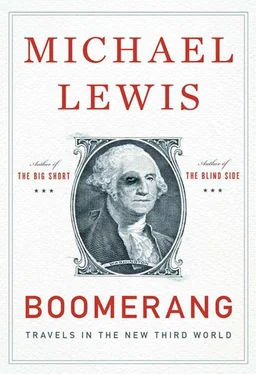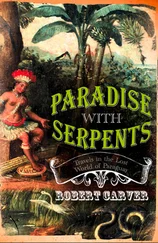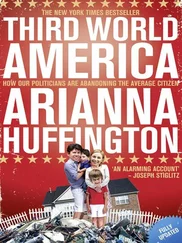“It’s one of those guys who has had a sex scandal,” says Arnold, smiling.
“Wait . . . wait,” says the woman to her phone. “Maybe it’s not Bill Clinton.”
Before she can make a positive identification the light is green, and we’re off.
His life has been a series of carefully staged experiences. He himself has no staged presentation of it, however. He is fresh, alive, and improvisational: I’m not sure even he knows what he will do next. He’s not exactly humble, but then if I had lived the life he’s lived I’m not sure I would be, either, though I might try to fake humility more often than he does, which is roughly never. What saves him from self-absorption, aside from a natural curiosity, is a genuine lack of interest in personal reflection. He lives the same way he rides his bike, paying far more attention to what’s ahead than what’s behind. In office, he kept no journal of any sort. I find it amazing, but he now says he didn’t so much as scribble little notes that might later be used to reconstruct his experience and his feelings about it. “Why would I do that?” he says. “It’s kind of like you come home and your wife asks you about your day. I’ve done it once and I don’t want to do it again.” What he wanted to do after a long day of being governor, more or less, was to lift weights.
We’re just a couple of miles in when he zips around a corner and into a narrow alleyway just off Venice Beach. He’s humoring me; I’ve been pestering him about what it was like for him when he first arrived in America, back in 1968, with little money, less English, really nothing but his lats, pecs, traps, and abs, for which there was no obvious market. He stops beside a tall brick wall. It surrounds what might once have been an impressive stone house that now just looks old and bleak and empty. The wall is what interests him, because he built it, forty-three years ago, right after he had arrived and started to train on Muscle Beach. “Franco [Columbu, like Schwarzenegger a former Mr. Olympia] and I made money this way. In bodybuilding there was no money. Here we were world champions of this little subculture, and we did this to eat. Franco ran the business. I mixed the cement and knocked things down with the sledgehammer.”
Before he stumbled while running downhill with a refrigerator strapped to his back, Columbu was the front-runner in the 1977 contest for the title of the World’s Strongest Man; so there was some distinction in being hired by his operation, as Schwarzenegger was, to be the muscle. They had a routine. Franco would play the unreliable Italian, Arnold the sober German. Before they cut any deal they’d scream at each other in German in front of the customer until the customer would finally ask what was going on. Arnold would turn to the customer and explain, Oh , he’s Italian, and you know how they are. He wants to charge you more, but I think we can do it cheaply . Schwarzenegger would then name a not-so-cheap price. “And the customer,” he says now, laughing, “he would always say, ‘Arnold, you’re such a nice guy! So honest!’ It was selling, you know.”
He surveys his handiwork. “It’ll be here for a thousand years,” he says, then points out some erosion on the top. “I said to Franco we ought to come back and fix the top. You know, to show it was guaranteed for life.”
A poor kid from a small village in Austria, the son of a former Nazi, hops on a plane to America, starts out laying bricks, and winds up running the state and becoming one of America’s most prominent political leaders. From post to wire the race takes less than thirty-five years. I couldn’t help but ask the obvious question.
“If someone had told you when you were building this wall that you would wind up governor of California, what would you have said?”
“That would be all right,” he said, not exactly catching my drift.
“As a boy,” I said, taking another tack, “did you believe you’d lead something other than an ordinary life?”
“Yes.” He didn’t miss a beat.
“Why?”
“I don’t know.”
“ No one has had this kind of crazy, wild ride,” he says, as we speed away from the brick wall, but in a tone that suggests the ride was an accident. “I was influenced a lot by America,” he said. “The giant six-lane highways, the Empire State Building, the risk taking.” He still remembers vividly the America he heard and read about as a boy in Austria: everything about it was big . The only reason he set out to grow himself some big muscles was that he thought it might be a ticket to America.
If there had not been a popular movement to remove a sitting governor, and the chance to run for governor without having to endure a party primary, he never would have bothered. “The recall happens and people are asking me: what are you going to do?” he says, dodging vagrants and joggers along the beach bike path. “I thought about it but decided I wasn’t going to do it. I told Maria I wasn’t running. I told everyone I wasn’t running. I wasn’t running.” Then, in the middle of the recall madness, Terminator 3: Rise of the Machines opened. As the movie’s leading machine he was expected to appear on The Tonight Show to promote it. En route he experienced a familiar impulse—the impulse to do something out of the ordinary. “I just thought, This will freak everyone out,” he says. “It’ll be so funny. I’ll announce that I am running. I told Leno I was running. And two months later I was governor.” He looks over at me, pedaling as fast as I can to keep up with him, and laughs. “What the fuck is that ?”
We’re now off the beach and on the surface roads, and the traffic is already heavy. He veers left, across four lanes of traffic, arrives on the other side, and says, “All these people are asking me, ‘What’s your plan? Who’s on your staff?’ I didn’t have a plan. I didn’t have a staff. I wasn’t running until I went on Jay Leno.”
His view of his seven years trying to run the state of California, like the views of his closest associates, can be summarized as follows. He came to power accidentally, but not without ideas about what he wanted to do. At his core he thought government had become more problem than solution: an institution run less for the benefit of the people than for the benefit of politicians and other public employees. He behaved pretty much as Americans seem to imagine the ideal politician should behave: he made bold decisions without looking at polls; he didn’t sell favors; he treated his opponents fairly; he was quick to acknowledge his mistakes and to learn from them, and so on. He was the rare elected official who believed, with some reason, that he had nothing to lose, and behaved accordingly. When presented with the chance to pursue an agenda that violated his own narrow political self-interest for the sake of the public interest, he tended to leap at it. “There were a lot of times when we said, ‘You just can’t do that,’ says his former chief of staff, Susan Kennedy, a lifelong Democrat, whose hiring was one of those things a Republican governor was not supposed to do. “He was always like, ‘I don’t care.’ Ninety percent of the time it was a good thing.”
Two years into his tenure, in mid-2005, he’d tried everything he could think of to persuade individual California state legislators to vote against the short-term desires of their constituents for the greater long-term good of all. “To me there were shocking moments,” he says. Having sped past a DO NOT ENTER sign, we are now flying through intersections without pausing. I can’t help but notice that, if we weren’t breaking the law by going the wrong way down a one-way street, we’d be breaking the law by running stop signs. “When you want to do pension reform for the prison guards,” he says, “and all of a sudden the Republicans are all lined up against you. It was really incredible and it happened over and over: people would say to me, ‘Yes, this is the best idea! I would love to vote for it! But if I vote for it some interest group is going to be angry with me, so I won’t do it.’ I couldn’t believe people could actually say that. You have soldiers dying in Iraq and Afghanistan, and they didn’t want to risk their political lives by doing the right thing.”
Читать дальше












